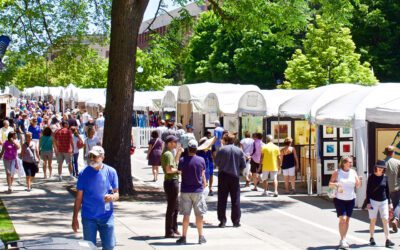For the first time since 1984, there will be no Ann Arbor Summer Festival. No big-name national acts at Power Center, no free concerts by local musicians at the Top of the Park.
No one’s more disappointed than executive director Michael Michelon. Right now, he and his staff should be racing toward June’s opening night. Instead, he’s spent the last two months dismantling what would have been his third festival — taking with it more than 40 percent of his operating budget.
It could have been worse. When they canceled at the end of March, “we were about to outlay significant costs that we would be unable to get back,” Michelon says — signing contracts for expensive acts and bringing on contract production staff.
Fortunately, most of the sponsors and underwriters had made their full commitment ahead of time and told Michelon to keep the funds. Others “who are facing their own challenges” are “giving what they could,” he says. “The support has been tremendous.”
Ann Arbor lost its citywide summer party and more than 100 local performers lost gigs. “We’re trying to transition those to other formats,” Michelon says. “We’re trying to find ways to honor the commitment.”
The pandemic “has put everything into perspective,” he emails later. “It’s important that we ask questions such as what practices have outlived their usefulness? What are new ways of approaching our work and partnering with other organizations?”
They’ve been consulting peers, including the International Festival of Arts & Ideas in New Haven, Connecticut, “because their profile and types of events are similar … We were both thinking about how to balance bringing our programs online virtually versus what we can create new that would be viable in a social distancing world.”
In May, Michelon and the festival’s four full-time employees were exploring concepts like “sidewalk serenades,” where people can sponsor a brief concert on their lawn by a solo artist or small ensemble. “We’re also thinking of doing pop-up concerts,” as well as online streaming.
They’ll make the first announcement on May 26. Most will fall within the traditional three-and-a half-week season, this year from June 12 to July 5, but they’re also planning to produce things into the fall.
“People are going to want to get out in some way, and so we’re trying to think about things that people can do that don’t involve screens,” he says.
But they probably will involve masks. “And some of them may be at home, he says, “or may involve pressing ‘play’ on something, to start an activity, but don’t involve having to keep your eyes glued to a screen.
“It’s an interesting juxtaposition,” he says, waxing philosophical. “The reason I like — the reason I love — live events is the certainty of uncertainty. That does not apply to the pandemic moment. If there’s one thing I’m tired of it’s the uncertainty as it relates to all these things.
“But I think that we all want the different type of uncertainty back. That might be, ‘What do we choose to do today?'”
—
The Ann Arbor Art Fair was canceled in early May.
“I’m a news-ie,” says Maggie Ladd, director of the South University Area Association, sponsor of Ann Arbor’s South University Art Fair. “I’ve been watching this since January, and reading Michigan.gov. As Michigan became more dire, I started asking myself, ‘What’s it like in the rest of the country? How many cases are there in the different states from where the artists come?’
“For me, it ended up being somewhat of a moral issue … we would be bringing about 1,000 artists, 500 vendors, artists’ assistants … that’s 2,000 people. Then the sponsors. … Could I in all good conscience bring them into my hometown?”
Frances Todoro-Hargreaves, executive director of the State Street District, also saw warning signs. A few of her older artists had called to say, “I’m concerned about my health, so I’m canceling my shows.”
“We were seeing other events already cancel,” says Karen Delhey, executive director of the Guild of Artists and Artisans, which operates the Ann Arbor Summer Art Fair and others, “so we already kind of knew this was a possibility when our stay-at-home order started.”
In mid-April, the directors had a video conference with representatives of the city — community services administrator Derek Delacourt, fire chief Mike Kennedy, and AAPD special services sergeant Bill Clock. “I took that feedback to the executive committee and updated my board,” says Todoro-Hargreaves. “And that’s when we all came to the realization of yeah, this isn’t going to happen.”
—
There’s no good time to cancel the Ann Arbor Art Fair, but if it had to be done, it “couldn’t have happened at a better time,” said Mo Riley, director of The Original art fair, formally known as the Ann Arbor Street Art Fair. She meant that there was still time to “put the brakes on things.” Her 2020 featured artist’s poster — the visual identity for the show each year — was “at the designer … a hair’s breadth from being released … now we can roll it over to 2021.”
The State Street District Art Fair had not yet chosen its featured artist, Todoro-Hargreaves says, so it gave everyone two options: “The first was to refund all their fees except for $100 administrative costs and keep their spot for next year; the second was a full refund but a new jury process for 2021.”
The other fairs, too, are offering full refunds or a rollover to next year. While there is some variation from fair to fair, “it’s the model that most shows across the country are doing,” Riley says.
“The effect the cancellation is having on our bottom line is not pretty,” Riley admits. She brings on her usual interns and part-timers for the summer, and furloughed a couple of staff members. She was able to bring them back later “to process the paperwork”—but once that’s done, she’ll likely have to let them go again.
Delhey says the Guild has five full-time and one half-time employee, “then we hire staffing for the summer — interns and staff — that we aren’t going to hire this year.”
The Guild had planned to hold seven events this year. They canceled the first and did a virtual fair instead. The second, scheduled the weekend of Mother’s Day in Birmingham, was postponed until August. She doesn’t yet know how that or the four later fairs will play out, so “I haven’t made any staffing decisions yet.”
“It’s really hard,” Ladd says. “Art fair isn’t just about the art fair organizations. It’s about the entire downtown, and the businesses and the hotels, the restaurants and bars. There’s a whole community affected by cancellation.”
—
No one is suffering more than the artists themselves.
“It’s heartbreaking,” says Riley. “As I watched other art fairs cancel across the country and absorb the impacts on the artists financially, it just became heartwrenching. This is their livelihood.
“It’s not only losing the Ann Arbor fair,” she points out. As fairs around the country cancel, “it’s four months of having really little income for those who do this circuit. It’s heartbreaking.”
The artists’ experience is vividly evoked in Dylan Strzynski’s forthcoming The Life You Make. He debuted it at a private streaming for GoFundMe supporters in May.
Strzynski and his wife, Helen Gotlib, both travel the circuit and show in The Original fair. (He calls his wide-ranging work “expressionistic mixed-media;” her spare images of nature blend drawing, printmaking, and mixed-media.) He considers art fairs “one of the purest expressions of the American spirit … of the intersection of art and commerce. It’s making something yourself, getting in a van, going out onto the open road, and selling that thing. It’s making your own life. That’s what this country is about.”
Most of the artists in the film—couples Joachim Knill and Janice Ho, and Lynn and John Whipple, mother and son Gillian and Michael Kemper, and others—have shown their work at one or more of the Ann Arbor fairs over the years. “They’re all friends of mine,” says Riley. “My reaction to the film? I won’t see these friends this summer. They won’t see each other. The friendships are so deep. It’s really a family … after I watched the film, I wanted to cry.”
Despite the rain, the heat, the packing up and tearing down, night after night in hotel rooms or RVs or vans, “what we do, it’s fun,” painter William Kwamena-Poh says in the film. “At the end of the day, I’ve paid my bills and settled my debts … I’m happy.” But this year, he won’t have the fun—or the income.
The fair organizers, too, are facing holes in their budgets and their schedules.
“Emotionally it’s been difficult,” says Delhey. “We’re all very passionate about this event. It takes up so much of your time and it’s so much of what we do on a daily basis.” Mournfully she added, “What am I going to do in July now? I’m not used to having a free summer.”
She won’t be entirely idle.”We do want to stay at the forefront of people’s minds, especially that week” of the fairs, she says. “We’re going to make [the artists] accessible to the community. We’ll do some online things; they’ll be on the website.
“We’re trying to come up with some kind of plan so that we can continue pushing them out to the community as well as the businesses. The event was started to help the economy in Ann Arbor during the summer, and with everything being shut down, this is even more devastating.”
As for next year’s fair, Ladd says, it’s “too early to speculate. There are too many things out of our control. We don’t know what’s going to happen with the virus.”
Yet, she adds, “artists are artists. They are going to make art. It’s a calling. How they sell it may change.”
“What else are we going to do?” one artist asks in The Life You Make. “Get jobs?
“We could, but that wasn’t the dream.”



